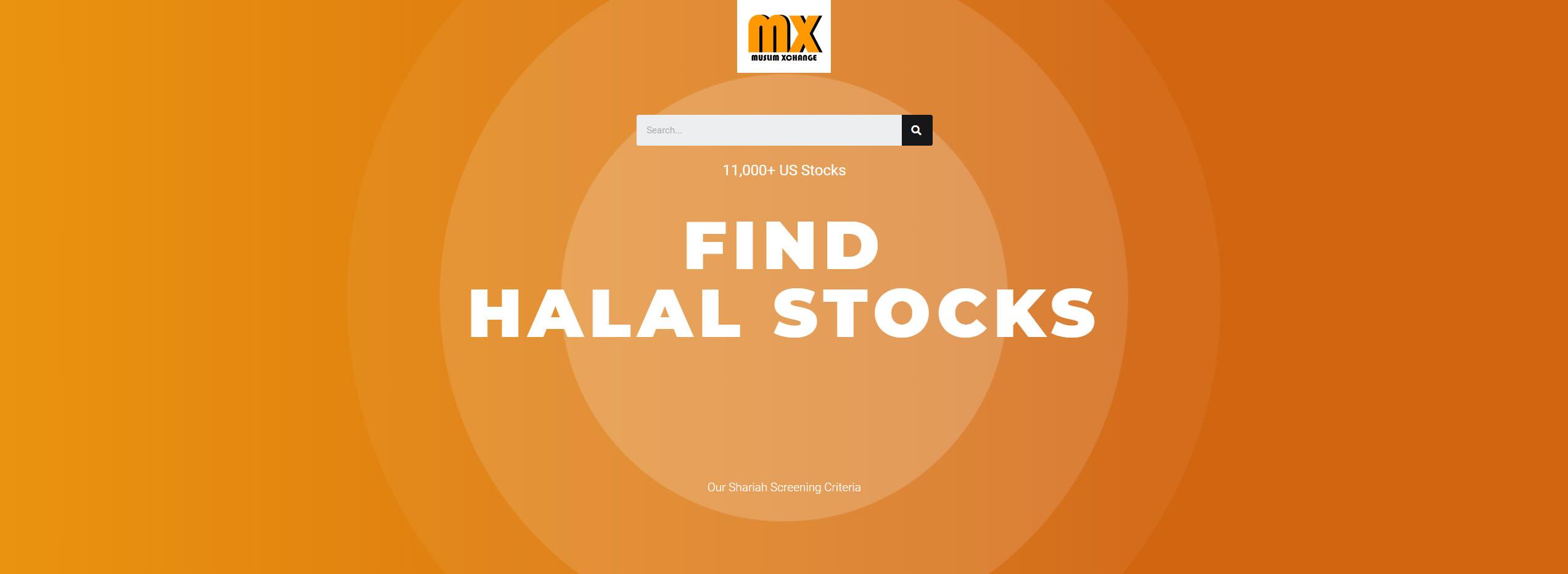Update: We have launched our own halal stock screener at Muslim Xchange
MANY Muslims find investing in the stock market and understanding Islamic requirements complicated. Some have resorted to using automated halal stock screeners without understanding their filters and limitations. This article demystifies the subject of halal stock screening and empowers anyone with little-to-no knowledge of finance to be able to understand and screen companies for Shariah compliance.
I will cover the background of how the Shariah standards came about, explain how to screen for halal stocks, compare different screening standards, and finally touch on the effectiveness of automated Shariah screening that several apps and websites are offering In sha Allah.
Quick Check
If you quickly want to check if a stock is shariah compliant, then see if*:
- a) The business is halal; haram revenues (including interest income) should not exceed 5% of total revenues (if you receive dividends purify the percentage of haram portion by giving it in charity);
- b) The total interest-bearing debt is less than 33% of total assets
*Based on the Shariah standards I prefer as explained below.
Having said that, it is important for Muslims to understand the background and reasoning for these parameters. This will clarify any confusions caused by different standards or apps, reduce volatilities in your investments, and help you make better decisions In sha Allah.
Background: How Shariah standards were formed
Can investment in the stock market be halal? This is a question that perplexes many, and it’s a valid concern to be fair. The Shariah requires us to invest only in companies that are fully halal. The firm should have a halal business and operate in accordance with the Shariah. This means, among other things, that the company must not take interest-based loans to finance its operations.
When Islamic scholars first issued a fatwa regarding the stock market in the 1990s (IIFA-OIC1 & IFC-MWL2)3, they stipulated conditions that the company must be completely shariah compliant. They did not allow investment in companies that, for example, took debt on interest. However, in present times, most companies take on conventional debt. This is the reality of the financial system we are part of. Taking on an optimum level of debt is, in fact, actively recommended in corporate finance because interest payments lower corporate taxes.
The initial Islamic rulings made it quite difficult for Muslims to invest in publicly-traded companies. Scholars then, recognizing the hardship imposed, tolerated some non-Islamic aspects as long as the company’s core business was halal and the violations were small in percentage. The relaxations are of course based on Islamic law, which has allowances for times of absolute need and necessity.
Consequently, the scholars looked at several aspects of Shariah and derived a set of rules for Muslims to participate in today’s Capital Markets. This set of rules form the basis of all existing Shariah standards with regard to investing in the stock market. Various institutions offer and implement Shariah standards for Capital Markets. The most popular among them is the AAOIFI (Accounting and Auditing Organization for Islamic Financial Institutions). They all, for the most part, have the same criteria. The differences will be explained below.
On a side note, it’s important that Muslims work on bringing an alternative market that promotes and facilitates fully shariah-compliant businesses.
How to screen for halal stocks
The information you need to screen can be found in the company’s profile and financial statements. Almost all websites you use for researching a stock will provide you with this information. There are two screens to look at for filtering halal stocks.
1. Business Screen
The first filter to check for is if the core business itself is halal or haram. They can fall into three categories.
a. Haram Business
Companies operating in the alcohol, gambling, movies, music, financial services (banking, insurance, mortgage financing, etc.), pork-related products, pornography, television and tobacco industries will not pass this filter. No further analysis is required to label them as non-compliant. Islamicly website has a detailed breakdown on filtering by the industry companies operate in.
b. Mixed Revenues
Companies that have multiple streams of revenue need to be checked for the sources of their revenues. Firms that have mixed revenues, i.e. some halal and others not, will fall into this category.
i. Haram revenues
In this case, if the percentage of haram revenues is less than 5%, then the stock is Shariah compliant. Most Shariah standards have set 5% as the maximum limit of tolerance for haram revenues. The Shariah justification is that a small amount of impurity will not corrupt the whole. Some scholars have stipulated that investors must purify their dividends or gains by giving the same percentage from their profits in charity.
ii. Interest Income
Similar to the point above on haram income, companies that use excess cash to earn interest income should be reviewed to see if their interest income (including any other haram revenue) is less than 5% of total revenues. A company’s Income Statement will list their interest income if any. This is separately listed from haram revenues for reader convenience.
❝
Most companies prefer to take on an optimum level of debt because interest payments reduce corporate taxes…
c. Halal Revenues
Last, but not the least, category is that of companies with only halal revenues and no haram revenues or investments. If a company passes the business compliance filter, the most important aspect of Shariah compliance is done. It can now be screened for financial ratios to check mainly how much interest-bearing debt it carries.
2. Financial Ratios Screen
Two main categories make up the second filter:
a. Interest-bearing Debt
As discussed above, most companies in this day and age prefer to take on an optimum level of interest-bearing debt because interest payments reduce corporate taxes. Riba’, loosely translated as Interest, is a major sin in the Islamic law. All associations with riba’ are condemned in the Shariah. Muslim entrepreneurs therefore must come up with innovative solutions to provide alternatives to the precarious situation we find ourselves in.
It is important to note that one group of scholars does not agree with the tolerance limits set by the Shariah standards. They opine that Muslims cannot invest in companies with violations such as Interest income.
Having said that, the Shariah standards stipulate that companies should have no more than a certain limit for interest-bearing debt. The limit varies from 30%-37% in different standards. The majority have either a 33% or 33.33% limit. AAOIFI has stipulated 30%.
Now what should the debt be a percentage of? The standards differ. Some check the level of debt against total assets of the company while others like AAOIFI check against market capitalization. This difference can give very different results.
I prefer the opinion of using total assets because market cap is subjected to various external factors. Market cap is the total value of a company’s shares. It is calculated by multiplying the share price with the total number of outstanding shares. We know that share price fluctuates due to a variety of reasons.
In his paper4, Muhammad Hanif writes, “Perhaps total assets base at book value or replacement cost is more relevant for the calculation of this ratio because debts are employed to finance assets and operations of the company, in the hope to create value for investors.”
It is important to note here that the allowance is for investment due to our current situation as explained. This does not mean Muslims can take loans on interest.
b. Liquidity Ratio
Many Shariah standards have another filter called liquidity ratio that measures the percentage of illiquid vs liquid assets. The idea is that a company with a very high percentage of liquid assets will take on the ruling that its shares represent the underlying cash itself.
Since money cannot be exchanged for a higher or a lower price, such shares of a company with a high liquidity ratio cannot be traded in a Shariah compliant manner according to this standard. There is a wide range of what is acceptable in this regard: from 66% to 83% of total assets. AAOIFI’s is 70%. With its update in August 2020, the AAOIFI has dropped the Liquidity ratio requirement.
The liquidity ratio rule is a little controversial. Many scholars and experts have opined otherwise. Two Shariah standards are silent on this filter. The ISRA-Bloomberg and Securities Commission of Malaysia do not stipulate a liquidity ratio condition. I personally prefer the latter opinion and do not agree on applying a blanket liquidity filter while screening stocks. This can be quite misleading in many cases.
❝
According to research, about 8.38% of stocks are wrongly classified by automated Shariah screeners
As many scholars have pointed out, a company is more than just its assets. People invest in a company due its business activity. Moreover, tech and online companies, which need very little illiquid assets to run their operations will mostly be screened out.
c. Cash and Accounts Receivables
Similar to the above discussion on the Liquidity ratio, many standards have rules that cash, equivalents, and Accounts Receivables should be less than a certain percentage of assets/market cap. The reasoning is similar because of the underlying financial assets. However, as explained above, I prefer the opinion/standards that do not include this rule. A company is more than just its assets. The standard adopted in Indonesia does not include these rules. The Malaysian standard does not include the one on Accounts Receivables (please see the comparison chart below for clarity).
Comparison of Shariah Screening Standards
| Index | Qualitative: Focus | Prohibited Activities | Quantitative: Debt | Impermissible Income | Cash | Receivables |
|---|---|---|---|---|---|---|
| AAOIFI / Philippines | Industry Screen | Core Business | Interest-based debt / 12-month avg. market cap < 30% | Must not exceed 5% of Total Revenues (including Interest income) | [(Cash + Deposits + Interest-bearing securities) / 12-month avg. market cap] < 30% | (Accounts Receivable, deposits and cash) / Total Assets < 67% |
| Dow Jones Islamic Market (DJIM) | Sector-based Screens | Partial Involvement | Total debt / trailing 24-month avg. market cap < 33% | 5% (excluding Interest income) | [(Cash + Interest-bearing securities) / trailing 24-month avg. market cap] < 33% | Accounts Receivable / Trailing 24-month avg. market cap < 33% |
| FTSE Shariah | Industry Screen | Core Business | Total debt / Total assets < 33% | 5% (including Interest income) | (Cash and Interest-bearing securities) / Total assets < 33% | Accounts Receivable and Cash / Total Assets < 50% |
| Indonesia | Business Activity | Core Business | Interest-based debt / Total assets < 45% | 10% (including Interest income) | n/a | n/a |
| MSCI Islamic | Industry Screen | Core Business | Total debt / Total assets < 33.33% | 5% (including Interest income) | Cash and Interest-bearing securities / Market cap (36-month avg.) < 33.33% | (Accounts Receivable and Cash) / Total Assets < 33.33% |
| MSCI Islamic M-Series | Industry Screen | Core Business | Total debt / market cap (36-month avg.) < 33.33% | 5% (including Interest income) | Cash and Interest-bearing securities / Market cap (36-month avg.) < 33.33% | (Accounts Receivable and Cash) / Market cap (36-month avg.) < 33.33% |
| Malaysia SC | Business Activity | Partial Involvement; taking into consideration: 1) Image of the company; 2) Maslahah (necessity), umum balwa (common plight), uruf (custom) | Debt / Total Assets < 33% | 5%-25% of Total Revenue | Cash/Total Assets < 33% | n/a |
| S&P 500 Shariah | Industry Screen | Core Business | Debt / market value of equity (36-month avg.) < 33% | 5% (excluding Interest income) | (Cash + Interest-bearing securities) / Market value of equity (3-month avg.) < 33% | Accounts Receivable / Market value of equity (36-month avg.) < 49% |
Automated vs Manual Screening of Stocks
As interest in stock market investing grows among Muslims, a number of automated halal stock screening apps and websites have come up. Muslim Xchange (by us), Islamicly, Zoya and Finispia are a few. The apps and websites do a quick automated check of the compliance filters and tell you if a company is halal to buy.
Although such services are quite useful and needed, we cannot completely rely on them. We must do a further manual analysis as to whether a company is Shariah compliant. Some companies may be flagged as non-compliant, but in reality they may be compliant. And sometimes a company may pass the compliance check, but we may know by digging in further that the company’s revenues are actually not from halal sources.
According to Cognizant’s research5, about 8.38% of stocks are wrongly classified by automated Shariah screeners. I believe the percentage will be much higher if we consider the false flags from the financial ratios as well.
This does not mean the screening tools are flawed. It’s just that automation does not capture important details, which can be done by reading more about the company. For example, the total debt listed on a company’s balance sheet may not necessarily be interest-based and a company operating in a halal industry may actually be part of a haram one.
Conclusion
It is best for Muslims who want to invest in the stock market that they educate themselves with regard to the Shariah rules so they are able to judge and make informed decisions. Equally important to mention at this point is that Muslims should not only learn the Shariah rules but also be well-versed with good investing strategies and how to pick good stocks for investment.
In a future article, we will discuss the different approaches people take to investing in the stock market and what approaches are best from both Islamic and worldly perspectives In sha Allah.
Faraz Omar has an MBA in Finance and is a passive investor. Special thanks to Farrukh Habib, Ph.D. in Islamic Finance, for reviewing an earlier version of the article.
References & Notes
1 International Islamic Fiqh Academy, a subsidiary of the Organisation of Islamic Cooperation
2 Islamic Fiqh Council, part of the Muslim World League
3 Habib, F., & Ahmad, A. (2017). REVISITING THE AAOIFI SHARIAH STANDARDS’ STOCK SCREENING CRITERIA. International Journal of Business and Society, 18(S1), 151-166.
4 Hanif, M. (2019). Shari’ah Screening Process of Capital Markets: An Evaluation of Methodologies. Journal of King Abdulaziz University Islamic Economics, 32(1), 23-42.
5 Sengupta, B. (2012). Sharia Stock Screening: A Fund Manager’s Conundrum (White Paper). Retrieved August 14, 2020, from Cognizant website
Limited free articles. Subscribe for full access.








 Dr. Bilal Philips
Dr. Bilal Philips